The Liturgical Face of Philanthropy
The Liturgical Face of Philanthropy
A Note from David P. King, PhD
Karen Lake Buttrey Director and Associate Professor, Philanthropic Studies, Lake Institute & Giving
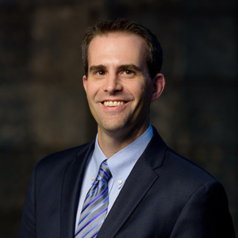 While reporting the trends in giving and volunteering data is vital to understanding faith and giving, it’s also true that data does not present the full picture. To understand why religion is such a dynamic force for many in charitable giving and humanitarian activities, we cannot miss the particular religious practices and theological frameworks that faith communities bring to this work. Add in the complexities of church, state, local charity, and global migration, and we can see the many ways of how faith inspires and informs giving. In the article below, Dr. Hannah Grace Howard illustrates the nuanced ways that liturgy shapes Greek Orthodox charity. Dr. Howard, a Boston University sociocultural anthropologist who has accepted a postdoctoral position at the Center for Theologically Engaged Anthropology at the University of Georgia, recently concluded her term as one of our 2024-25 Lake Doctoral Dissertation Fellows. Stay tuned for our next Dissertation Fellowship application cycle, and continue to follow the work of Dr. Howard and the many ways that theology and practice shape our understanding of charitable giving.
While reporting the trends in giving and volunteering data is vital to understanding faith and giving, it’s also true that data does not present the full picture. To understand why religion is such a dynamic force for many in charitable giving and humanitarian activities, we cannot miss the particular religious practices and theological frameworks that faith communities bring to this work. Add in the complexities of church, state, local charity, and global migration, and we can see the many ways of how faith inspires and informs giving. In the article below, Dr. Hannah Grace Howard illustrates the nuanced ways that liturgy shapes Greek Orthodox charity. Dr. Howard, a Boston University sociocultural anthropologist who has accepted a postdoctoral position at the Center for Theologically Engaged Anthropology at the University of Georgia, recently concluded her term as one of our 2024-25 Lake Doctoral Dissertation Fellows. Stay tuned for our next Dissertation Fellowship application cycle, and continue to follow the work of Dr. Howard and the many ways that theology and practice shape our understanding of charitable giving.
By Hannah Grace Howard, PhD, Postdoctoral Fellow in UGA’s Center for Theologically Engaged Anthropology
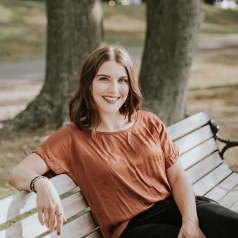
Within the international spiritual marketplace, it is perhaps an obvious truism that many religious organizations participate in, deeply care about, and are motivated by notions of charity. Whether dubbed charity, philanthropy, or mission work, various traditions around the globe concern themselves with welfare and emergency intervention through both large organizations and smaller parish-based associations.
Within Orthodox Christianity specifically, the International Orthodox Christian Charities (IOCC) organize an array of relief services for those in need. Given its global structure and thematic focus on emergency relief, the work of the IOCC fits rather neatly within a broader humanitarian system that incorporates much of both religious and secular aid. These global humanitarian logics are often replicated across space and differing traditions. However, in my anthropological work on Greek Orthodox charity in Athens, I have found that there are other aspects to charity that do not easily scale or replicate precisely because they cannot be fully understood through the lens of humanitarianism. While they may not scale, it is my contention that these smaller, more face-to-face, ritualized, and relationship-focused forms of aid are essential for the liturgical life of many communities.
This modal distinction was first brought to my attention by a priest in Athens, Greece with whom I worked closely for over a year. From our very first interaction, it was exceptionally apparent to me just how involved this priest was in the daily reality of communal life at his parish. He was everywhere – in the cathedral, in the parish office, in the kitchen, in the streets. Over countless cups of coffee, he spoke to me about the importance of the Gospel, the Church’s responsibility to its community, and the shape of the liturgical life of both individuals and the Church writ large. He was an astute scholar of both scripture and ritual practice, as well as a wonderful storyteller.
On one occasion, he began weaving together multiple New Testament parables and his own experiences as a longtime priest. As he did this, he explained that everything in these stories is an icon, just as how we live must be an icon. Everyone was always talking about icons in these conversations. I swirled my Greek coffee around gently, watching the grounds at the bottom of the small cup stir and then settle. The steady motion helped me think. I had been trying to get him to talk about the humanitarian mission of the Church of Greece and relate it to the wider aid network in Athens, and now here we were again talking about icons. His gaze returned to mine, and he smirked a little, in a way I had come to recognize – the smirk that told me he didn’t think I had quite understood his point.
“Humanitarianism, solidarity, philanthropy – these are all just words. No one really understands what solidarity means and so it has become too complicated. And anyway, it’s not just solidarity that we’re doing. It’s liturgy. So you see, the liturgy on Sundays is not the only liturgy. We must also pull the liturgy into our lives. And this is why we do what we do.” I wanted to be sure I had heard correctly, even through the layers of translation happening in my head. “Wait, wait – perimene! – the work we do of feeding and clothing people is an icon of liturgy, it is like liturgy, or it is liturgy?” “It is liturgy, my child, naturally. It’s the work of the Church in the world,” he replied.
From the moment that this priest helped me realize just how much the work of the Church diverged from typical humanitarian sentiments, I sought to understand what it might mean for charitable care to be liturgical and thus potentially sacramental. His words represent an undeniably theological claim with significant political consequences, and after spending so much time with the people who thought and acted liturgically, it is a claim I take quite seriously. Like other ethnographers of Orthodox societies, I saw my interlocutors’ lives – and thus their charity – as inseparable from the liturgical modalities and theological principles of community and self that the Church cultivates.
The principles that guided this priest’s charitable work are given shape and a name specifically by the theologian Father Alexander Schmemann, who calls the work of the Church in the world “the liturgy after the liturgy.” In his treatises on liturgical and eucharistic theology, he argues that the Church operates as a mission in the world – that charity and care for others are direct extensions of the Eucharist itself. In other words, if the preparation and dispensation of the Eucharist, the holy gifts of bread and wine, brings a human into full personhood through their relationship with Christ, the experience of care brings them into full personhood through their relationship with others. This is a fundamentally different understanding of charity than one which relies on humanitarian principles of relieving suffering. Further, it is an understanding that urges us as scholars, practitioners, and people of faith to more deeply consider both the inspirations and the possible consequences of our charitable care.
Ultimately, while large-scale systems of intervention highlight the humanitarian concerns of many Orthodox practitioners, they do little to illuminate these localized ways that such concerns are integrated into the wider ethos, theology, and praxis of specific groups on the ground. My work thus proposes a different paradigm of aid that operates under a logical framework distinct from the humanitarian logics that have guided many understandings of charity and instead engages with religious philanthropy as a key sacramental piece of liturgical practice. Many congregations looking to mobilize charity at the local scale thus might benefit from observing the ways in which philanthropic missions bring people together in meaningful ways and create linkages between charitable care work, ritual spaces, and communal salvation.
Hannah Grace Howard is a Postdoctoral Fellow at the Center for Theologically Engaged Anthropology at the University of Georgia. Her work concerns the political and theological principles that guide Orthodox Christians’ community and self-making strategies in Athens, Greece. Her doctoral dissertation, completed at Boston University, specifically addressed this topic in the context of charitable care practices around the city.
Expanded Perspective: Compassionate Stewardship
By Fr. Jim Kordaris, Archdiocese of America, Director of Stewardship, Outreach & Evangelism.
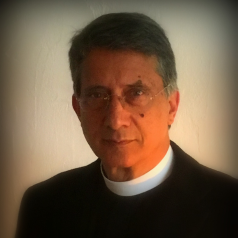
The dismissal of an Orthodox Christian Divine Liturgy is not an ending but rather, a beginning. The words “Let us go forth in peace” send us out to the world in which we live and work to witness our faith, not with words, but with love and compassion for others.
To love in the way Saint Paul writes to the Christians at Corinth means that we can’t live without compassion for others. The love that Saint Paul describes in his letter is an expression of stewardship. Stewardship is everything we do after we say, “I believe.” Stewardship is about how we live our lives and make our choices. Love and stewardship are inseparable when we consider God’s blessings in our lives. This guides the way we use His gifts with love and compassion for others.
We are called to be compassionate stewards, placing the needs of others before our own. Scripture is filled with passages of God’s call for us to be generous, loving, compassionate givers. In his Second Letter to the Corinthians, Saint Paul tells us of God’s call for us to “excel in the grace of giving.” We are “hard-wired” to live as members of the Body of Christ and serve our larger community with compassion and love.
Our parishes can be transformed, becoming beacons of Christian love as we care for one another, face challenges together, and serve our neighbors. We would be known as Christians by the love and compassion we embody as a parish family.
The priority of compassionate stewardship is not paying the congregation’s bills. It is about how we, as a community, can do God’s work with love and compassion. It is less about the parish’s need to receive, and more about our need to give. It is our generosity with the gifts and blessings God has entrusted to us. Compassionate stewardship is an attitude and a way of life.
Fr. Jim Kordaris serves the Archdiocese of America as Director of Stewardship, Outreach & Evangelism. In September 2018, after fourteen years at Saint George Church in New York City, Fr. Jim began a new parish ministry at Saint George Church in Kingston, New York, a town of approximately 23,000 and a parish of approximately 100 families. Fr. Jim is gradually initiating ministries to strengthen and grow the parish. Fr. Jim is also an adjunct faculty member with Lake Institute. He is married to Cally (Moraitis). They live in Cold Spring, New York, with their teenage son, Christopher.
2025 Lake Doctoral Dissertation Fellowship Recipient
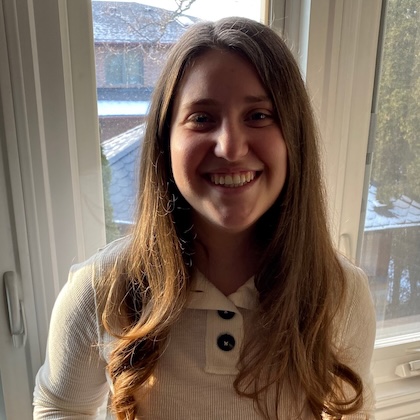 Melina Economou is a PhD Candidate in Anthropology at the University of California San Diego. She earned a Master of Arts in Anthropology from the University of California San Diego, and a Bachelor of Science in Biological Anthropology and History from the University of Toronto. Her dissertation project, ‘If we don’t meet here again, we’ll meet in the great beyond:’ End of Life Care and Volunteerism in Canada, explores how people with life-limiting prognoses can experience dying as a quotidian reality – sometimes for weeks, months, or even years, they continue living while dying in what becomes a unique time and space that is open-ended and liminal. People with life-limiting illnesses continue to form social relationships with hospice volunteers, make decisions about their care, negotiate affective changes concerning hope, dignity, grace, and faith, and contemplate spiritual and religious beliefs about dying and death.
Melina Economou is a PhD Candidate in Anthropology at the University of California San Diego. She earned a Master of Arts in Anthropology from the University of California San Diego, and a Bachelor of Science in Biological Anthropology and History from the University of Toronto. Her dissertation project, ‘If we don’t meet here again, we’ll meet in the great beyond:’ End of Life Care and Volunteerism in Canada, explores how people with life-limiting prognoses can experience dying as a quotidian reality – sometimes for weeks, months, or even years, they continue living while dying in what becomes a unique time and space that is open-ended and liminal. People with life-limiting illnesses continue to form social relationships with hospice volunteers, make decisions about their care, negotiate affective changes concerning hope, dignity, grace, and faith, and contemplate spiritual and religious beliefs about dying and death.
ECRF 2026 Schedule
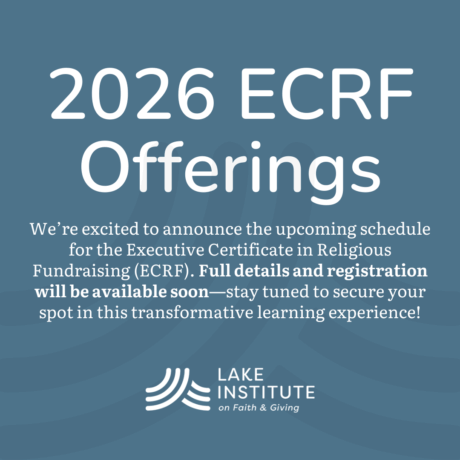
We’re excited to announce the upcoming schedule for the Executive Certificate in Religious Fundraising (ECRF). Registration is now open, and full details are available!
The Executive Certificate in Religious Fundraising (ECRF) is a program of Lake Institute on Faith & Giving. To learn more about the ECRF program, course objectives, required readings and final project, visit the ECRF main page.
Subscribe
Insights is a bi-weekly e-newsletter for the religious community and fundraisers of faith-based organizations that provides:
- Reflections on important developments in the field of faith and giving
- Recommended books, studies and articles
- Upcoming Lake Institute events
